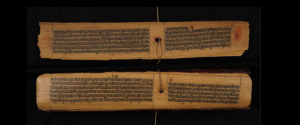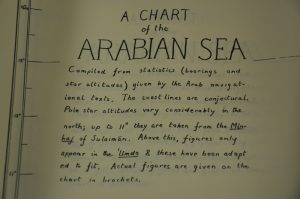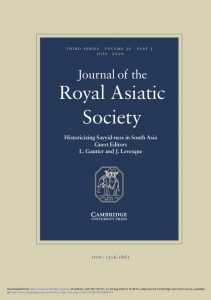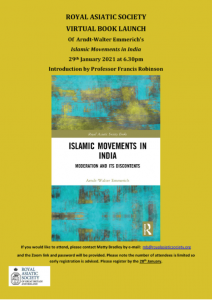Reflecting on the past year
For the last blog post of 2020, we are reflecting on the activities that have taken place around the Society during the past year. Having only joined the RAS towards the end of the year (in October), when writing this post, I was astounded by what has been achieved throughout the Society during this extraordinary year.
Events go virtual:
Special mention must go to Alison Ohta and Matty Bradley for their incredible efforts to ensure some of our events could continue virtually over Zoom. These have been an incredible success and have allowed several events to be broadcast to audiences across the world who would not usually be able to attend events in person. These have been covered in blog posts throughout the year, but recent highlights include: book launches of ‘The Extroadinary Epoch of Nanasaheb Peshwa’ by Uday S. Kulkarni, ‘Local States in an Imperial World: Identity, Society and Politics in the Early Modern Deccan’ by Roy Fischel and a translation of ‘Aap Beeti’ by Tript Kaur; the Society’s ‘Collections Evening’ and a lecture by Fuchsia Hart on ‘Fath- ‘Ali Shah Qajar and the Shrine of Fatima Ma’sumeh, Qom.’ There is also an upcoming book launch of the publication, ‘Islamic Movements in India’ by Dr. Arndt Emmerich. More information about this is highlighted further down in this post. Some of these are now also posted on the Society’s YouTube channel with several already getting over 100 views! These can be found at: https://www.youtube.com/channel/UCXi0hS5mxNzy7icPV485FfQ
Digital Library:
With access to the Society’s collections being limited, people have been drawn to our digitised collections with figures growing rapidly. During the period from April to August there were 4,650 visits from 3,460 users who between them viewed almost 17,000 pages. These figures amounted to almost double the number for the same period in the previous year. Our digitised palm leaf manuscripts on the Internet Archive have also been seen by almost 20,000 visitors this year, most views coming from India, Nepal, and Sri Lanka. We hope to digitize more of our collections within the coming year.

Collections work has continued throughout:
Our Reading Room has been open by appointment whenever Government regulations have permitted. Otherwise, work to catalogue and digitize our collections has continued during the pandemic. Archival collections that have been catalogued on the Archives Hub include: The Oriental Translation Fund papers, the personal papers of scholars Gerald Tibbetts, Angus C. Graham, and Edward Conze, and material from the institutional archive. Cataloguing is now about to commence on the ‘Events and Lectures’ section of our institutional archives; more will be revealed about this in the new year.

Publications have continued to thrive:
The Journal of the Royal Asiatic Society has continued to be published on Cambridge Core, with four issues released during the year. A special edition of JRAS was released in the Summer titled ‘Historicizing Sayyid-ness: Social Status and Muslim Identity in South Asia.’ Contributors to this edition explored changing conceptions of ‘Sayyid-ness’ in various historical contexts in South Asia. All of these issues can be viewed on Cambridge Core at: https://www.cambridge.org/core/journals/journal-of-the-royal-asiatic-society/listing?q=&searchWithinIds=D70E68907DDF872EE920CC1BC27B6544&aggs[productTypes][filters]=JOURNAL_ARTICLE Members of the Society have free access to past and current issues of the Journal.

First event in 2021 has been announced:
While we are coming to the end of 2020, the Society is starting to put together a programme of events and lectures that will be held next year. For the time being, these will continue to be held virtually, pending future Government announcements. The first of these will be a book launch on Friday 29th January of Islamic Movements in India by Dr. Arndt Emmerich. This book analyses the emerging trend of Muslim- minority politics in India and suggests that a fundamental shift has occurred over the last 20 years from an identity-dominated, inward-looking approach by Muslim community leaders, Islamic authorities and social activists towards an inclusive debate centred on socio-economic marginalisation and minority empowerment.

Please email Matty Bradley at: mb@royalasiaticsociety.org if you would like to attend. We look forward to seeing some of you there.
Journal news:
We also have some exciting news about the Journal and on the 1st January we welcome four new members to the Editorial Board of the Journal. These are:
Aparna Kapadia: Associate Professor of History, Williams College, Massachusetts, who researches and teaches South Asian History, literary and popular culture, Indian Ocean history, history of food and culinary practices. Her most recent book ‘In Praise of Kings: Rajputs, Sultans and Poets in 15th-century Gujarat’ was published by CUP in 2018.
Ismail Alatas: Assistant Professor of the Department of Middle Eastern and Islamic Studies, New York University. He studies Islamic communities in Indonesia with books published in Indonesia and articles in the Journal of Islamic Studies, Indonesia and the Islamic World, Comparative Studies in Society and History, and the Journal of the Royal Anthropological Institute.
Andrea Acri: Ecole Pratique des Haute Etudes, Section des Sciences Religieuses, Paris. He works on Hinduism, Buddhism, Tantra, Old Javanese and Sanskrit texts. He is also a Visiting Fellow at the Oxford Centre for Hindu Studies.
Wang Shih-Pe: Deputy Vice-President for Student Affairs National Taiwan University; Visiting Scholar SOAS China Institute; Member of the Board of the Publishing Centre of Taipei National University of Arts, and of the Editorial Board of Journal of Chinese Ritual, Theatre and Folklore. With Tian Yuan Tan and Paul Edmondson she is co-author, 1616: Shakespeare and Tang Xianzu’s China (Bloomsbury, Arden Shakespeare, 2016).
The Council is delighted to have appointed scholars with such wide expertise and research backgrounds contributing directly to the investigation and encouragement of the sciences, literature, and the arts, in relation to Asia.
From January 2021 the composition of the Editorial Board of the Journal will be:
Timothy May and Francis Robinson: to serve until December 2021; Sherman Taylor, Tsai Weipin, Andrea Acri: to serve until December 2022; Evrim Binbas, Francois de Blois, Arthur Dudney, Michael Feener: to serve until December 2023; Peter Frankopan, Aparna Kapadia, Wang Shih-Pe, Ismail Alatas: to serve until December 2024.
Professors Tsai Weipin, Kapadia, Wang Shih-Pe and Alatas are also Associate Editors.
The Hon Editor, Professor Ansari, commented on how exciting it is to welcome these four new colleagues to the Editorial Board: “their combined expertise represents a hugely valuable asset for the Journal, and I very much look forward to working with them in the coming years”.
Charlotte de Blois, the Executive Editor added that the appointment of our new Associate Editors is welcome. As the Journal’s remit covers a large geographical area and a great expanse of time it is not possible for any single person to have detailed knowledge of every topic that may feature in material submitted to us. Increasing the breadth of our academic expertise on the editorial team will be useful.
Christmas wishes for the New Year:
To end this post, we would like to offer our warmest Christmas wishes and give special thanks to all of you for your continued support throughout the year. We look forward to sharing more news and reflections about the Society’s activities and collections in the new year.
